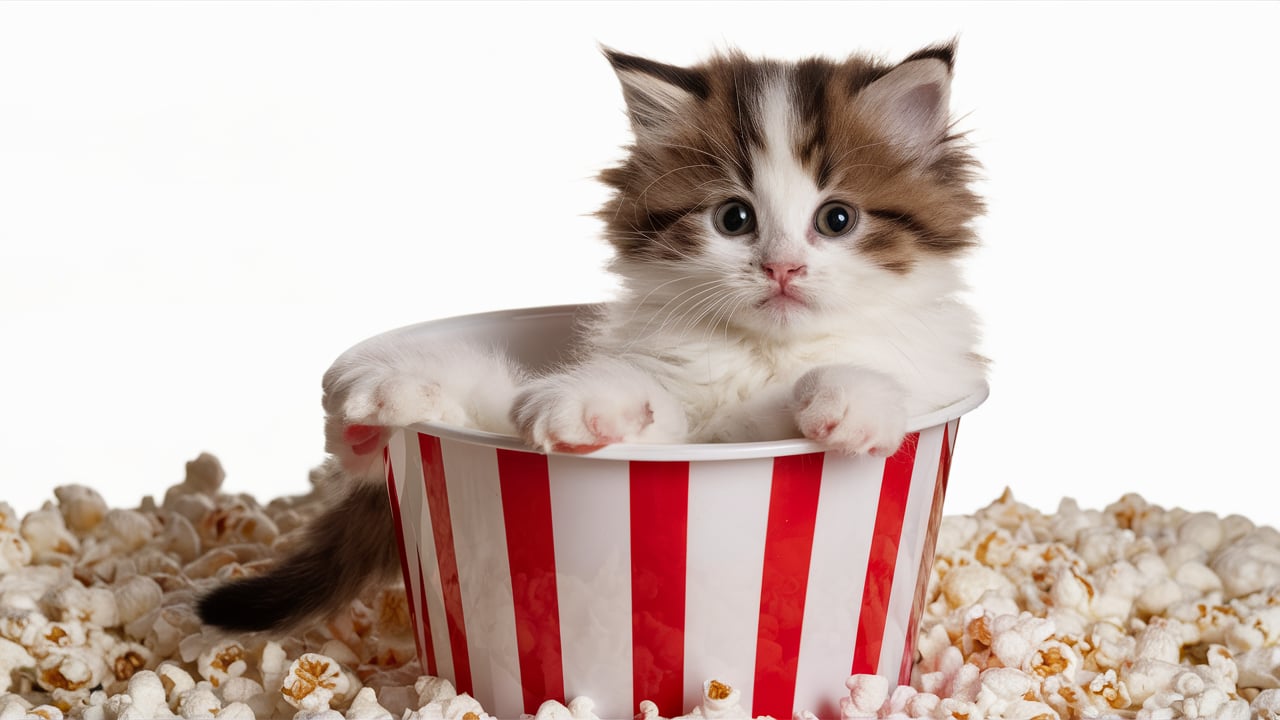Can cats eat popcorn? While the image of a cat munching on popcorn might be cute, it’s important to understand the potential risks and benefits. In this article, Cat Safety Tips will explore the answer, helping you make informed choices about your cat’s health and well-being.
Can cats eat popcorn?
Popcorn, a human favorite, is mostly carbs and fat, with a little protein thrown in. While that’s great for us, it’s not ideal for our feline friends. Cats are built for a meat-heavy diet, requiring lots of protein and fat, and they don’t need carbohydrates.
While popcorn does contain some minerals and B vitamins, the amounts are too small to make a nutritional difference for your cat. In short, there’s no known health benefit to popcorn for cats, so it’s best to stick to their regular food and safe treats.
Is popcorn bad for cats?
Yes, popcorn is generally considered bad for cats, despite the cute image of a cat munching on a kernel. Here’s why:
Choking Hazard
Unpopped kernels are a significant choking hazard, especially for kittens. Their small size and the way cats swallow can make it difficult for them to manage.
Digestive Issues
Popcorn is high in fiber, which can cause digestive upset in cats. Their digestive systems are designed for meat-based diets, not high-fiber snacks. This can lead to gas, bloating, and diarrhea.
Unhealthy Ingredients
Most popcorn is loaded with butter, salt, and artificial flavors that are harmful to cats. Butter and salt are high in sodium and fat, which can contribute to weight gain and other health problems. Artificial flavors can also cause digestive issues and allergies.

Potential for Toxicity
Some popcorn toppings, like artificial sweeteners (xylitol is especially dangerous), garlic powder, onions, and other seasonings, can be toxic to cats. Xylitol, a common artificial sweetener, is extremely toxic to cats and can even be fatal.
How much popcorn can a cat eat?
While a stray popcorn kernel probably won’t cause a major problem for your cat (unless they choke, of course!), it’s best to avoid making popcorn a regular treat.
Here’s why:
- No Nutritional Value: Popcorn offers no real nutritional benefit for cats. It’s mostly carbs, and cats, being obligate carnivores, don’t need or digest carbs efficiently.
- Weight Gain and Diabetes: Regular popcorn consumption can contribute to weight gain and increase the risk of diabetes in cats.
- Digestive Issues: A large amount of popcorn can lead to digestive problems like gas, bloating, and diarrhea.
If your cat happens to snag a few pieces while you’re not looking, they’ll likely be fine. But it’s best to keep popcorn out of their reach and stick to safe, cat-specific treats. If your cat eats a large amount of popcorn and shows signs of lethargy or vomiting, contact your vet immediately.
What if my cat eats a small amount of popcorn?
If your cat eats a small amount of popcorn, it’s important to monitor them closely for any signs of digestive upset. Even a small amount can cause problems, especially if it’s unpopped kernels or if the popcorn has butter, salt, or other seasonings.
Here’s what to watch for:
- Vomiting: This is a common sign of digestive upset in cats.
- Diarrhea: Loose stools or increased frequency of bowel movements can also indicate a problem.
- Loss of appetite: If your cat is not eating as much as usual, this could be a sign of discomfort.
- Abdominal pain: Your cat may show signs of pain by hunching their back, vocalizing, or being reluctant to move.
- Lethargy: If your cat seems sluggish or inactive, this could be a sign of illness.
If you notice any of these symptoms, contact your veterinarian immediately. They can assess your cat’s condition and provide appropriate treatment if necessary.
Alternatives to popcorn for cats?
Cat-Safe Treats
- Commercial Cat Treats: Choose treats specifically formulated for cats. Look for options with high-quality protein, low in fat and sugar, and free from artificial colors and flavors.
- Homemade Cat Treats: There are many recipes online for healthy homemade cat treats using ingredients like chicken, fish, or sweet potatoes. Always consult your vet before introducing new foods.
Water
Other Safe Treats (In Moderation)
- Cooked Chicken or Fish: Small pieces of cooked, plain chicken or fish can be a tasty treat for cats.
- Fruits and Vegetables: Some fruits and vegetables, like blueberries, cranberries, and green beans, can be given in small amounts as treats. Always consult your vet to make sure they’re safe for your cat.
In conclusion
Can cats eat popcorn? It’s a question that often pops up, especially during movie nights. While the image of a cat munching on popcorn might be cute, it’s important to know the facts before sharing your snack. Let’s explore the potential risks and benefits of popcorn for our feline friends.

Related Post
Home Remedies For Lethargic Cat: Bring Back The Energy!
Is It Bad For Cats To Eat Dog Food? A Risky Choice
Can Cats Have Bread? The Truth About Feline Diets